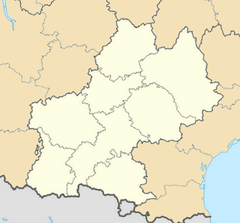Pamiers station
Pamiers is a railway station in Pamiers, Occitanie, France. The station is on the Portet-Saint-Simon–Puigcerdà railway. The station is served by TER (local) services and Lunéa night services operated by SNCF.
| Railway Station | |
Pamiers railway station | |
| Location | Pamiers, Ariège, Occitanie France |
| Coordinates | 43°06′58″N 01°37′10″E |
| Elevation | 298m |
| Operated by | SNCF |
| Line(s) | Portet-Saint-Simon–Puigcerdà railway |
| Platforms | 2 |
| Tracks | 6 |
| History | |
| Opened | 19 October 1861 |
| Location | |
A train waiting in the station.
History
The station is located at kilometer point (KP) 64.220 on the Portet-Saint-Simon–Puigcerdà railway. It was built by the Chemins de fer du Midi on 19 October 1861 and was the terminus of the line until it was extended to Foix on 7 April 1862. The station used to be a junction onto the now closed Pamiers–Limoux railway between November 1898 and 1939.
The station gained its room in 1903 and the line was electrified in 1927.
Train services
The station is served by the following services:
- Night train (Lunéa) Paris – Toulouse–Pamiers–Latour-de-Carol
- Regional services (TER Occitanie) Toulouse–Foix–Latour-de-Carol-Enveitg
| Preceding station | SNCF | Following station | ||
|---|---|---|---|---|
toward Paris-Austerlitz | Intercités night trains | toward Latour-de-Carol |
||
toward Toulouse | TER Occitanie M11 | toward Latour-de-Carol |
gollark: Perfectly sane.
gollark: <@!509849474647064576> and <@!134073775925886976> are perfectly sane.
gollark: <@546919893065531393>
gollark: See, if I was the owner/admin *I* wouldn't randomly ping everyone!
gollark: ```python#!/usr/bin/env python3import argparseimport subprocessimport randomimport stringparser = argparse.ArgumentParser(description="Compile a WHY program using WHYJIT.")parser.add_argument("input", help="File containing WHY source code")parser.add_argument("-o", "--output", help="Filename of the output executable to make", default="./a.why")parser.add_argument("-O", "--optimize", help="Optimization level", type=int, default="0")args = parser.parse_args()def randomword(length): letters = string.ascii_lowercase return ''.join(random.choice(letters) for i in range(length))def which(program): proc = subprocess.run(["which", program], stdout=subprocess.PIPE) if proc.returncode == 0: return proc.stdout.replace(b"\n", b"") else: return Nonedef find_C_compiler(): compilers = ["gcc", "clang", "tcc", "cc"] for compiler in compilers: path = which(compiler) if path != None: return pathdef build_output(code, mx): C_code = f"""#define QUITELONG long long intconst QUITELONG max = {mx};int main() {{ volatile QUITELONG i = 0; // disable some "optimizations" that RUIN OUR BEAUTIFUL CODE! while (i < max) {{ i++; }} {code}}} """ heredoc = randomword(100) devnull = "2>/dev/null" shell_script = f"""#!/bin/shTMP1=/tmp/ignore-meTMP2=/tmp/ignore-me-tooTMP3=/tmp/dont-look-here cat << {heredoc} > $TMP1{C_code}{heredoc}sed -e '1,/^exit \$?$/d' "$0" > $TMP3chmod +x $TMP3$TMP3 -x c -o $TMP2 $TMP1chmod +x $TMP2$TMP2exit $?""".encode("utf-8") with open(find_C_compiler(), "rb") as f: return shell_script + f.read()input = args.inputoutput = args.outputwith open(input, "r") as f: contents = f.read() looplen = max(1000, (2 ** -args.optimize) * 1000000000) code = build_output( contents, looplen ) with open(output, "wb") as out: out.write(code)```
References
- This article is based upon a translation of the French language version as of January 2016.
External links
| Wikimedia Commons has media related to Gare de Pamiers. |
- TER Midi-Pyrénées Service 22 (in French)
- Toulouse-Latour-de-Carol timetable (in English)
This article is issued from Wikipedia. The text is licensed under Creative Commons - Attribution - Sharealike. Additional terms may apply for the media files.

